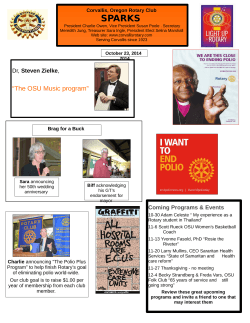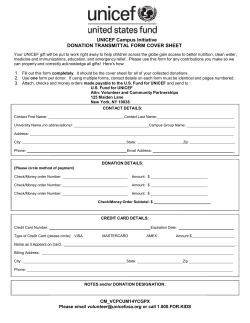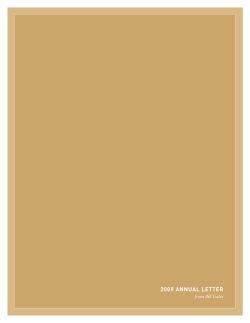
An important turn around
An important turn around Moulana Akram Mustafa Ayyubi* giving OPV to a Haj traveler on 3rd Nov 2007 at the office of AL-Mustafa magazine in Firozabad city, at present one of the most sensitive areas in the polio programme in western U.P. *Moulana Akram is the Chief Editor of AL-Mustafa magazine, in which he had published a negative article on OPV in February 2007. The negative article led to a considerable negative backlash for the programme, exacerbated by the death of a child following immunization earlier this year. UNICEF, Jamia Hamdard and NPSP provided consistent support to the district health department in advocating with the editor for a reversal of his position. Today, the editor has not only adopted a positive outlook on the polio programme, but participated in administering OPV to Haj travelers at his own office this month. 300 pilgrims participated in the event. Firozabad remains a vital link in the effort to keep P1 transmission under control, given its geographic proximity to the highly sensitive zone of western U.P. Haj update Phase 1: In September 2007, OPV was given to the Haj travelers. Out of 30,263 total Haj pilgrims from UP, 22,114 attended polio advocacy meetings in 44 districts where UNICEF’s social mobilization network is deployed (73% of total pilgrims in UP); 21,668 Haj pilgrims attending advocacy meetings received OPV (72% of the total pilgrims from UP). Phase 2: During this phase in October and November, meningitis vaccine was given to the Haj pilgrims. During this phase also UNICEF and NPSP supported government in planning and mobilized the Haj travelers for vaccination. This provided another opportunity for polio advocacy and its impact on the coverage was seen during the October polio SIA round. Haj travel: The first contingent of the Haj pilgrims from UP left on 11th November. UNICEF is distributing local IEC material prepared for health precautions during the pilgrimage and also polio appeals at different Haj houses in UP. The pilgrims are being requested to say prayers for polio eradication during their visit to Mecca and Medina. Haj and advocacy for the November SIA: UNICEF will publish special polio ads in different newspapers before and during the polio round that starts on 25 November. The ad will contain the Saudi Directive on OPV with images of male and female pilgrims being administered OPV. Polio advocacy on the occasion of Eidul Fitr, in the Bareilly sub-region. 564,800 people were exposed to polio messages on 14th October 2007 across the four districts. Number of Eidgahs/mosques promoting polio during Eid, Bareilly sub-region, October 2007 • Estimated Eidgahs/ mosques in Bareilly subregion with planned Eid prayers: 1174 • Number of Eidgahs/ mosques where polio advocacy was planned: 615 (52%) • Number of Eidgahs/ mosques where polio messages were delivered during sermons: 577 (49%) 500 450 450 400 400 350 300 280 267 250 200 200 170 156 150 124 90 100 89 75 65 50 0 Bareilly Baduan Pilibhit Shahjahanpur Estimated Eidgahs/mosques in district Total Eidgah/mosque with planned polio programme Total Eidgahs/mosques that delivered polio messages in sermons Renewed support Polio advocacy at the All India Jamaitul Quresh Conference on 28th October 2007, Delhi. Sirajuddin Qureshi (at microphone), re-elected President of the AIJQ, reiterates the AIJQ’s resolve to continue the fight against polio. Follow-up: National & states level Quresh leaders issued passionate polio appeals at this important conclave. These appeals will be printed and their CDs will be distributed and displayed in Quresh dominated areas of the priority districts in UP in the build up to the polio SIA at the end of November. Why Qureshi support is critical The Quresh community is traditionally organized around the occupation of slaughtering animals and trading in meat. It is one of the most underserved Muslim communities in western U.P., with consistent reporting of polio cases. Until early 2006, there were 2,300 openly noncompliant families in Meerut city, most of them were clustering in localities inhabited by Quresh families. The health department, UNICEF, NPSP, Rotary, CORE and other polio partners have made concerted efforts to mobilize these communities by engaging with Quresh leadership and institutions. UNICEF’s SMNet in Meerut has compiled a directory which has over 1000 names and contact numbers of key local influencers who have been supporting vaccination teams, including members of the All India Jamaitul Quresh. Through all of these efforts, at present there are only 400 isolated families in the district who are overtly or covertly refusing to accept OPV. Reaching Hindu nomads Polio advocacy with nomad communities on 28th October, Etah, western U.P., attended by 2,500 people. Important leaders who addressed the participants and appealed for polio vaccination included Ram Beer Upadhayay (State Minister) and Satish Jatav (Chairman, State Backward Commission). Nomad community constitute a small proportion of the Hindu underserved communities. However, they are highly mobile and their lifestyle expose their children to poliomyelitis. This is one of the few Hindu underserved communities that has been reporting polio cases in U.P.
© Copyright 2025














